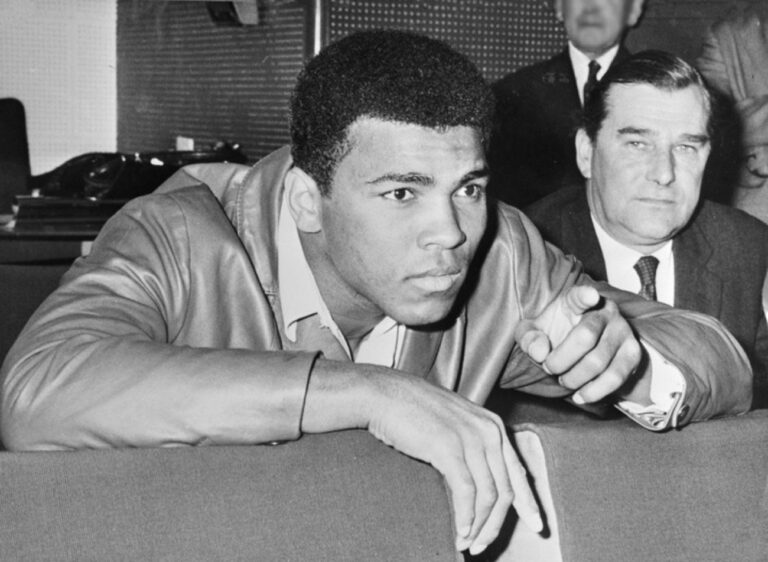By Ken Hissner: I was thinking, WHAT IF how different Muhammad “The Greatest” Ali’s career would have been if he didn’t declare to become a member of the Nation of Islam after defeating Sonny Liston in February of 1964?
WHAT IF Ali would have for instance decided to join the Army reserves for six months while fighting the other six months? Instead, by refusing to enter the Army, claiming to be a conscientious objector based on his religious beliefs, he was convicted of draft evasion on June 20, 1967. He was fined $10,000 and sentenced to five years in prison.
He appealed his conviction to the U.S. Supreme Court, which ruled unanimously in his favor on June 28, 1971. While he was appealing his conviction, Ali was free on a $5,000 bond. He tried to get a fight but was unable to get a boxing license in any state. WHAT IF he left the country like some Americans who got drafted and went to Canada?
Ali was stripped of his license by both the New York State Athletic Commission and the WBA. On March 3, 1969, the WBC also stripped Ali of their title. When he returned to boxing, Ali was getting hit more than ever, unlike when he was able to avoid being hit so often. That inactivity cost him.
WHAT IF Ali took the advice of his cut-man Dr. Ferdie Pacheco who refused to continue working his corner and quit boxing after defeating Leon “Jinx” Spinks in their rematch in September of 1978 at the New Orleans Superdome? Instead, Ali had two more fights losing to WBC Heavyweight champion Larry “The Easton Assassin” Holmes, 35-0, two years later in October of 1980, being stopped for the only time in his career, and former WBC champion Trevor Berbick, 19-2-1, in Nassau, in the Bahamas in December of 1981.
Looking back at Ali in the amateurs, he then, as Cassius Clay, lost in the 1960 Olympic trials at heavyweight to Percy Price, Jr. He then was allowed to enter the light heavyweight trials stopping Allen Hudson to go to Rome, Italy, for the Olympics, where he won the Gold Medal.
Ali would spar against world heavyweight champion Sweden’s Ingemar Johansson. He impressed boxing trainer Angelo Dundee at the Miami 5th Street Gym and began training him.
Ali was sent there by eleven businessmen named the Louisville Sponsoring Group, who signed to manage him on October 26, 1960. They had signed him to a $10,000 signing bonus and, for the first two years, a guaranteed draw of $333.00 a month against earnings. The group had an option of extending him for four more years on their initial contract, a 50-50 split and then 60-40 in Ali’s favor.
The trainer’s expense would come out of the group earnings, and 15% of Ali’s earnings would be set aside in a pension fund, which he could not touch until he was twenty-five or retired from boxing. His last fight under the group was with Brian London on August 6, 1966. Ali refused to re-sign with them and instead signed with Herbert Muhammad.
With the help of Georgia State Senator Leroy Johnson, Ali was able to obtain a license to fight in Georgia. On September 10, 1970, Ali and Jerry Quarry, 37-4-4, signed to fight in Atlanta, Georgia, on October 26, 1970, whom Ali stopped in three rounds. Johnson was also involved in the promotion of this fight.
On September 14, of 1970, a federal judge ruled that the New York Athletic Commission’s ban on Ali “constituted an arbitrary and unreasonable departure from the commission’s established practice of granting licenses to applicants convicted of crimes or military offenses.” Ali was then granted a license to fight Oscar Bonavena, 46-6-1, in New York on December 7, 1970, whom he stopped in the fifteenth round.
On March 8, 1971, Ali lost a decision to “Smokin” Joe Frazier, 26-0, for his WBC and WBA heavyweight titles at Madison Square Garden in New York.
This period of time from when Ali, as the world champion, made his defense, stopping Zora Folley, 74-7-4, in March of 1967 until trying to regain his title in his match with Frazier was four years.
So many WHAT IF’S were in Ali’s career being stopped from refusal to enter the Army to trying to regain the title he was stripped of.

